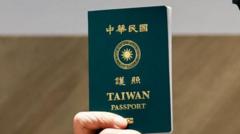Italy has tightened citizenship acquisition criteria for descendants of Italian ancestors, aiming to enhance genuine connections while addressing growing passport exploitation.
Italy Revises Citizenship Rules for Descendants of Italian Ancestors

Italy Revises Citizenship Rules for Descendants of Italian Ancestors
New law imposes stricter requirements for obtaining Italian citizenship through lineage.
Italy has officially revised its citizenship regulations, imposing stricter criteria on individuals aiming to secure Italian passports through their ancestry. The new law, passed by parliament on Tuesday, shifts the requirements under the 'jus sanguinis' principle, which traditionally allowed anyone with an Italian ancestor dating back to after March 17, 1861 - the year of Italy's unification - to apply for citizenship.
Under the amended provisions, applicants are now required to demonstrate that at least one parent or grandparent was a citizen by birth. The Italian government cited the need to strengthen the relationship between the country and its citizens living abroad, while also curbing what it deems the 'abuse' and 'commercialization' of citizenship, which has seen a notable increase in demand.
The number of Italian citizens living abroad surged by 40% from late 2014 to the end of 2024, with estimates rising from approximately 4.6 million to around 6.4 million. As of March—when the new law was introduced—over 60,000 citizenship applications were pending due to the backlog.
The Ministry of Foreign Affairs emphasized that the law aims to improve the efficiency of consular services, enabling support to be directed towards those with a legitimate connection to Italy. Foreign Minister Antonio Tajani reinforced the government's intention to maintain access to citizenship for Italian descendants but highlighted the necessity of implementing defined boundaries to prevent misuse in the application process. “Citizenship must be a serious matter,” he remarked, reinforcing the need for the changes.



















